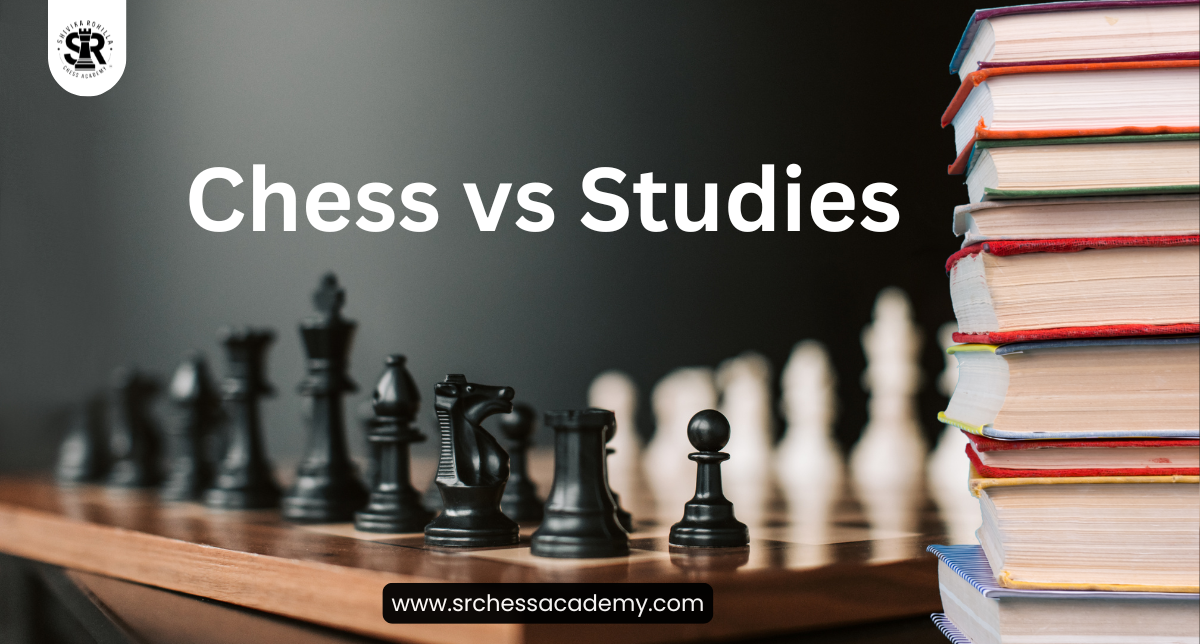
Chess vs Studies Striking the Perfect Balance and Managing Exam Stress
Introduction
In today's competitive world, excelling in both academics and sports is a challenge that many young chess players face. The journey of a chess player is not just about moving pieces on a board but also about navigating the complexities of studies, exams, and overall development. With the right strategies, parental support, and expert guidance, chess players can effectively balance both pursuits and even use chess as a tool to manage exam stress with ease.
The Chess-Academics Dilemma
Chess is a game that demands intense focus, strategic thinking, and long hours of practice—qualities that are also essential for academic success. However, many young players and their parents struggle with the fear that investing time in chess might compromise academic performance. The key lies in creating a structured routine that allows students to excel in both domains without feeling overwhelmed.
Learning from "Pariksha Pe Charcha 2025"
Honorable Prime Minister Narendra Modi, in his annual "Pariksha Pe Charcha 2025," emphasized the importance of reducing exam stress through proper planning, self-discipline, and maintaining a positive mind set. He highlighted that extracurricular activities like chess help in cognitive development, memory retention, and stress management—skills that are invaluable during exams.
How Chess Helps in Managing Exam Stress
Chess players naturally develop skills that help them stay composed and tackle pressure effectively. Here’s how chess contributes to academic excellence:
- Enhanced Focus & Concentration – Chess players train to think deeply and analyse a move, which helps them stay focused during long study sessions.
- Better Time Management – The ability to play under time constraints sharpens decision-making skills, helping student’s complete exams efficiently.
- Stress Resilience – Chess teaches patience and composure, enabling students to remain calm and confident under academic pressure.
- Improved Memory & Critical Thinking – Remembering opening theories and calculating variations strengthens cognitive abilities, aiding in subjects like mathematics and science.
Tips for Balancing Chess and Studies
1. Create a Well-Structured Routine
Having a daily planner with designated time slots for both chess and studies helps in maintaining discipline and avoiding last-minute cramming.
2. Set Clear Priorities
During tournament seasons, a player may reduce study hours but should never completely neglect academics. Similarly, during exams, chess training may be adjusted but should not be abandoned.
3. Leverage Chess Techniques for Studying
Applying chess techniques like visualization, pattern recognition, and strategic planning to academic subjects can make learning more efficient.
4. Stay Physically and Mentally Fit
Regular exercise, meditation, and deep-breathing techniques can significantly reduce stress and improve overall performance.
5. Seek Guidance from Experts
Parental support is crucial, but sometimes, professional help is required. Consulting a sports psychologist or a school counsellor can help manage stress and optimize performance in both chess and studies.
Parental Support: A Game Changer
Parents play a vital role in their child’s chess and academic journey. Supporting the child during both tournaments and exams ensures they feel emotionally secure and motivated. Here’s how parents can help:
- Encourage without Pressuring – Motivate children to give their best without creating undue stress.
- Provide a Healthy Environment – Ensure proper rest, nutrition, and relaxation to enhance mental well-being.
- Celebrate Small Wins – Acknowledge every milestone, whether it’s a chess victory or academic improvement.
Professional Support: Chess Consultation & Sports Psychology
For chess players aiming to excel in sports and academics, professional guidance can be a game-changer. Shivika Rohilla Chess Academy (SRCA) offers specialized services tailored to young chess players, including:
- Sports Psychology Support led by Dr. Nanaki J. Chadha, helping players manages stress, anxiety, and performance pressure.
- Chess Consultation with GM Tejas Bakre, providing strategic guidance to enhance playing skills without compromising academics.
- Academic and Parental Guidance with Dr. Nidhi Bhasin Rohilla, an educationist and the mother of Delhi’s Pride, WFM Shivika Rohilla, sharing her expertise on balancing studies and sports effectively.
Conclusion
Balancing chess and studies is not about choosing one over the other; it’s about integrating both in a way that complements overall growth. With proper time management, professional guidance, and unwavering parental support, young chess players can thrive academically while pursuing their passion for the game. As Prime Minister Narendra Modi rightly emphasizes in “Pariksha Pe Charcha”, adopting the right mind set and strategies can transform challenges into opportunities.
For expert guidance on sports psychology, chess coaching, and academic balance, connect with S R Chess Academy, where we help young talents unlock their full potential on and off the board!
